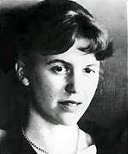- Shopping Bag ( 0 items )
From Barnes & Noble
Our ReviewThe Silent Woman, in Her Own Words
Sylvia Plath is a shoo-in for anybody's shortlist of the most talented poets of the 20th century. Her 1966 collection, Ariel, continues to stun new generations of readers -- and her prose work, as the seminal semiautobiographical novel The Bell Jar demonstrates, is hardly far behind. Now The Unabridged Journals of Sylvia Plath reveals her as a genius even in the off-hours; these pages throb with her fierce, pounding intensity, her uniquely incantatory cadences, and the searing flashes of brilliance from her uncannily insightful inner eye.
Plath's journals have been published before, but in a heavily abridged and problematic form. The 1982 Dial Press edition, directly authorized by Ted Hughes, Plath's husband, contains only 40 percent of the material collected here; its entries are interpolated with disturbingly reductive psychoanalytic explanatory assertions and, perhaps most troubling, riddled with the marks of perplexing and at times suspect omissions. These redactions and additions tamper with the intrinsic logic and integrity of Plath's writing, and together they exacerbate the iconization of Plath as a mysterious but misguided genius. Fortunately, these textual faults are eliminated in the new book. Editor Karen Kukil, an assistant curator of rare books at Smith College, where the journals are housed, has remained faithful to Plath's original words even to the extent of reproducing spelling errors and has all but limited her editorial comments to her meticulous notes. The frequent omissions within entries have been filled in, and whole regions of previously unpublished material -- including two manuscript notebooks written between 1957 and 1959 (which were only unsealed by Hughes shortly before his death in 1998) -- dramatically open up Plath's intimate world.
Plath is brutally honest in these pages. Interspersed with joyful descriptions of landscapes, friends, and even foods, entry after entry is an unshrinking act of the excoriation and exorcism of her perceived defects both as a person and as a writer. In a sense, this restored record is the central authorial act of her life; it is a kind of home base where Plath dreams up new projects, drums up the energy to undertake them, and exactingly judges her past achievements. Yet although this book will be compulsively appealing to Plath's readers, it will also be vitally compelling to anyone interested in the human soul and its predicaments. It is a rare, crystalline document of the struggle of a great and unflinching spirit.





Overview
First U.S. Publication
A major literary event—the complete, uncensored journals of Sylvia Plath, published in their entirety for the first time.
Sylvia Plath's journals were originally published in 1982 in a heavily abridged version authorized by Plath's husband, Ted Hughes. This new edition is an exact and complete transcription of the diaries Plath kept during the last twelve years of her life. Sixty percent of the book is material that has ...